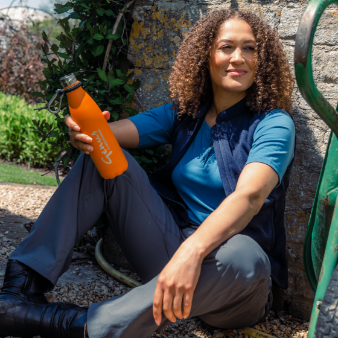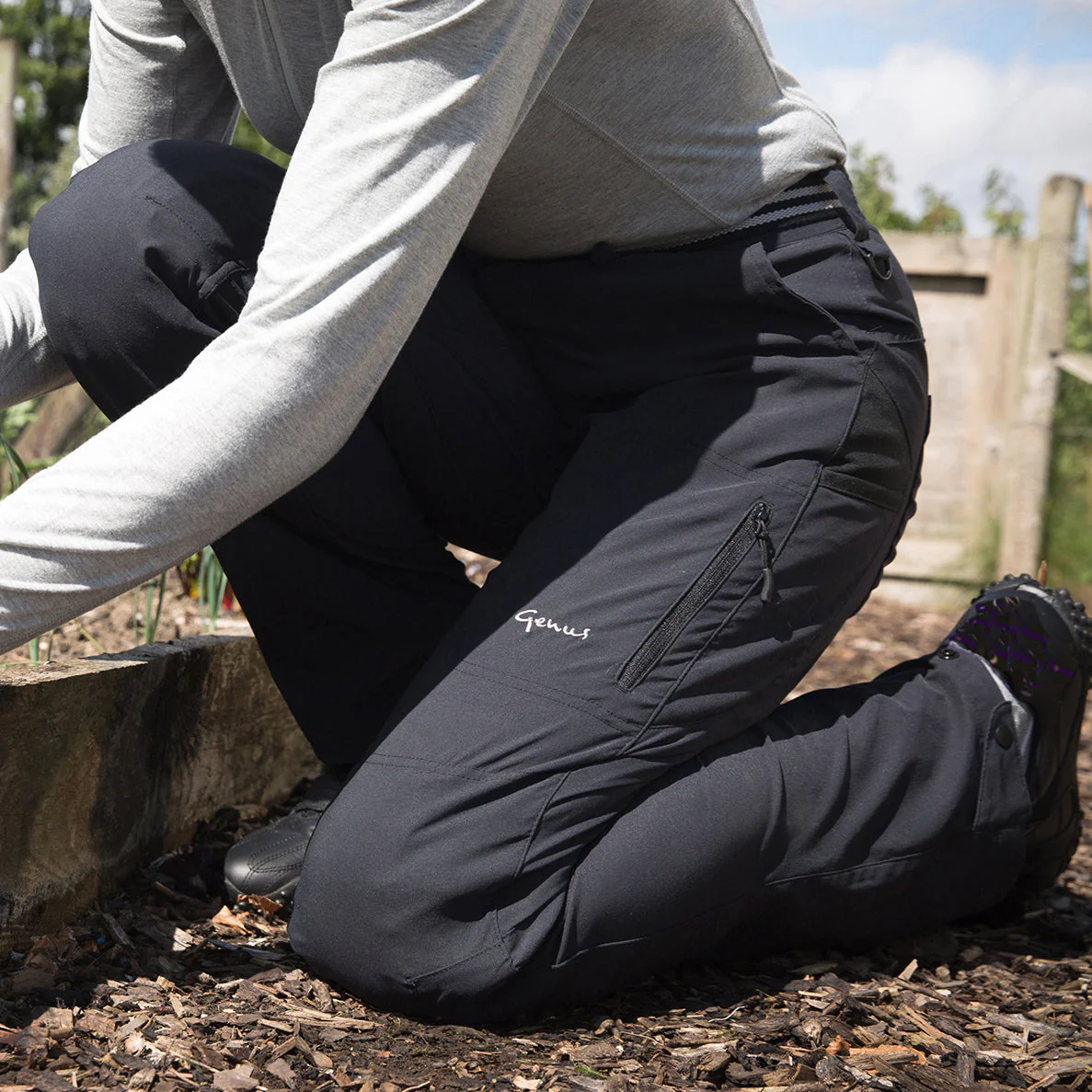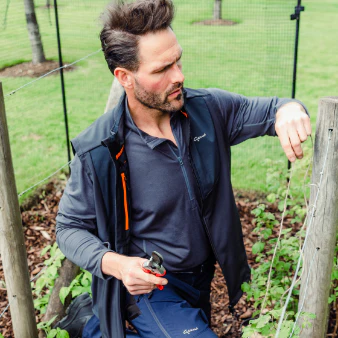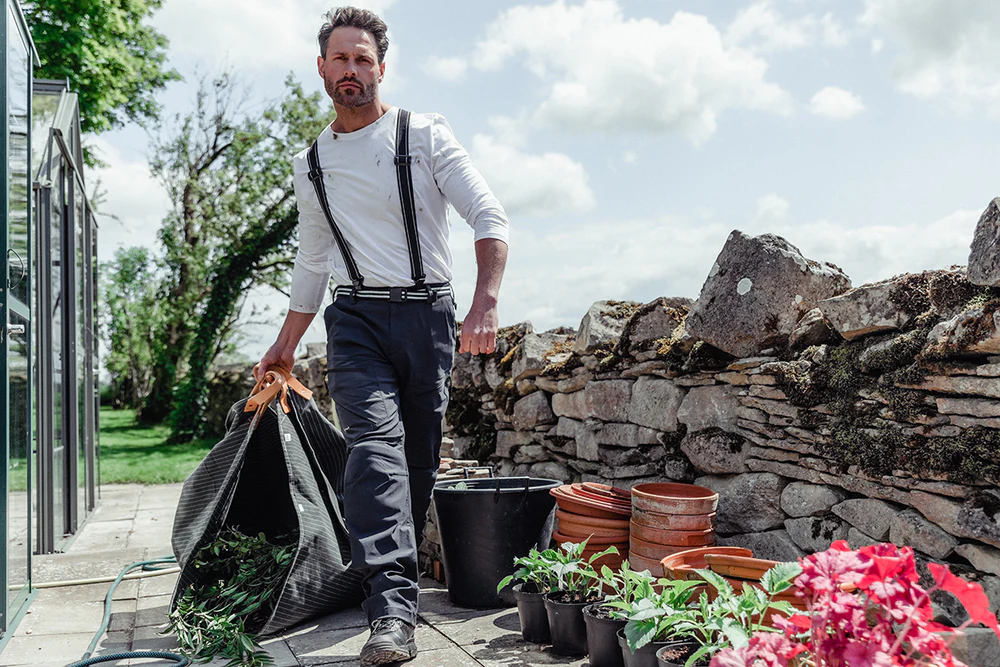The Genus Garden in China

A couple of years ago, we were looking to change the factory where our clothes are manufactured. We had been using a facility in the east of China, but we weren’t completely satisfied, and we thought how wonderful it would be to manufacture in the UK. So, Julie, our clothing designer, and I, the founder of the company, set off to search for a British factory.
It wasn’t that easy to find them in the first place, but we did identify three candidates and sent each a sample of our 3-Season Gardening trousers. The first two said they couldn’t produce them at all, and the third said that they didn’t have the right machine to make the zipped in pockets and they would go ahead so long as we paid £20,000 to buy them the machine! So much for our idealistic attempt to return clothing manufacture to the UK!
I would point out here that we do produce some of our accessories in Britain and we are continuing to develop our accessory range in collaboration with manufacturing companies all over the UK.
Through the process of looking for clothing production, we learnt a few interesting things. Firstly, Britain began to lose its textile production skills decades ago when brands took their production offshore to reduce costs. You can’t just click your fingers and get those skills back – it takes time and lots of investment. We also discovered that Britain is still good at high quality traditional clothing manufacture, producing relatively simple designs from natural fabrics made of wool and cotton; but whilst we were getting rid of our skills and offshoring our clothing production, other countries were developing world-class expertise in more modern technical fabrics and complicated constructions.
China, and also Taiwan, specialise in milling the sort of fabrics that are used in the outdoor and sports sectors and in manufacturing the very complicated designs of, say, mountaineering trousers or the sort of outdoor jackets that use multiple fabrics in one garment and need techniques such as seam taping to maintain waterproofness. The Genus trousers, for example, have layers of pocket upon pocket upon lining and interlinings, highly complex constructions that floored the British factories but are bread and butter to the Chinese ones.
So, Julie and I redirected our attentions to finding the very best Chinese factory. Once again, we selected three and sent them a sample of our trousers. This time the selection criteria were cost and how well they communicate. Because the process of development and production is lengthy and highly technical, and because communication is almost exclusively through email, it’s very important that the person dedicated to your account, who is called a Merchandiser, is able to write well in English and turns around a response speedily. One factory stood out from the others, one that Julie had been working with for decades. She had told me that this factory was quite different from any other she had worked with and I decided to pay them a visit.
This was my first visit to China and I was very much looking forward to it, but I wouldn’t be able to stay away for long. My travel arrangements meant I only stayed one night in China, and the other two nights on planes! The factory is in a small town called Yingde which is a two-hour drive north of Guangzhou, which itself is a few hours’ drive north of Hong Kong.
I was met by Tom, the son of the owner of the business, who drove me from Guangzhou to Yingde. We crossed the mountain range that girdles Guangzhou, passing through forests and glades of towering bamboo. Tom explained that he had gone to university in Holland which is why he speaks such good English! I didn’t ask but assumed that he also speaks Dutch. In the early 2000s, the factory changed its strategy from working on high volume, low value products for retailers such as Tesco to focus on premium ranges for outdoor brands in the UK, North America, Europe and Japan. This required a significant downsizing and the factory relocated out of Guangzhou to Yingde.
I was learning a lot. The choice of Yingde is interesting. Workers in clothing factories in the big cities such as Shanghai or Guangzhou tend to come from the villages and live in on-site accommodation. Come the three-week holiday that is Chinese New Year, these workers go home to their villages and possibly either don’t come back or change employer. Churn for factories after Chinese New Year is significant and they lose several additional weeks in loss of productivity whilst they train up the new employees. Yingde, on the other hand, doesn’t have a tradition of textile production: it is a stone quarrying town. There isn’t ready employment for the wives of men working in the stone quarries, so the management of our factory decided to set up in Yingde and offer permanent employment to the women. Good for the women and good for our factory because the employees live at home, stay put during the New Year holiday, and return to work afterwards.
This business also sets itself apart from most in China because it was founded by two colleagues, both women. This is very unusual in such a patriarchal society. Julie says that they are always referred to as 'the ladies'!
The factory occupies the site of an old agricultural college. They have refurbished the main teaching block and have put up a second building. No whiff here of a sweatshop – everything is incredibly modern, air-conditioned, bright, spotlessly clean, and technologically advanced. The range of machinery is amazing – not just sewing machines as I expected, but specialist kit to sew quilting in unusual patterns, to insert zips, to fix waterproof taping to seams, and to automate the hundreds of processes involved in the production of technical clothing. But most importantly the employees look happy with the work they are doing.
I was given a copy of the company’s Corporate Social Responsibility and Environmental Handbook with headings such as “No Discrimination”, “No Child Labour”, “Freedom of Association and the Right to Collective Bargaining”, everything you would expect in a first world factory. People work six days a week, Sunday is a holiday, but staff are paid overtime rates on Saturdays.
Lunch is provided in the staff canteen; and once again the factory is unusual in that the food served to the staff is the same as the food served to management. The 'ladies' believe that food served to workers should not be of a lower standard than the food they eat themselves. There is also an outdoor basketball court, and an indoor handball court, table tennis and a stage.
Back in my previous career as an international development consultant, I was advising on several projects that involved clothing production. In Mauritius I visited clothing factories that definitely looked like sweatshops and in Egypt I saw children weaving rugs, their feet barely able to reach the pedals of the looms. Not in China, however, at least not at the factory I was visiting.
But what excited me more than anything was the garden. The old agricultural college sits in very large grounds with a lake stocked with fish, orchards, vegetable gardens and flower gardens. Just like in any of our agricultural or horticultural colleges, the grounds were used to demonstrate and teach best practice. Nowadays, the factory maintains and develops the gardens and orchards for the benefit of the staff. There’s an extensive rose garden, an orchard with papaya trees and other fruits which, as well as the vegetable gardens, supply the staff canteen. There’s one area with hundreds of Osmanthus fragrans trees that smell beautiful in the autumn. Staff can walk around the garden during their rest times and can even come with their children at weekends to help out with the gardening.
This factory is a perfect match for Genus – technical high-performance clothing in a horticultural setting. I couldn’t have been happier. We have been working with Tom and his team for about two years now and we certainly consider ourselves to be a partnership of equals. We fondly think of the garden in Yingde as the Genus garden In China and we can't wait to pay our next visit.











